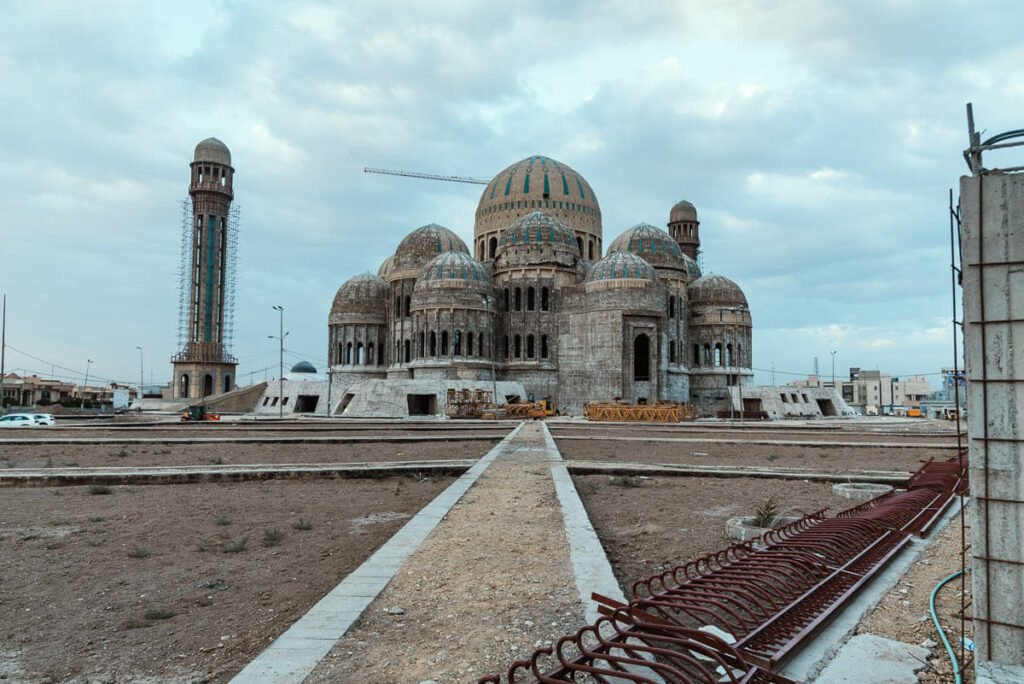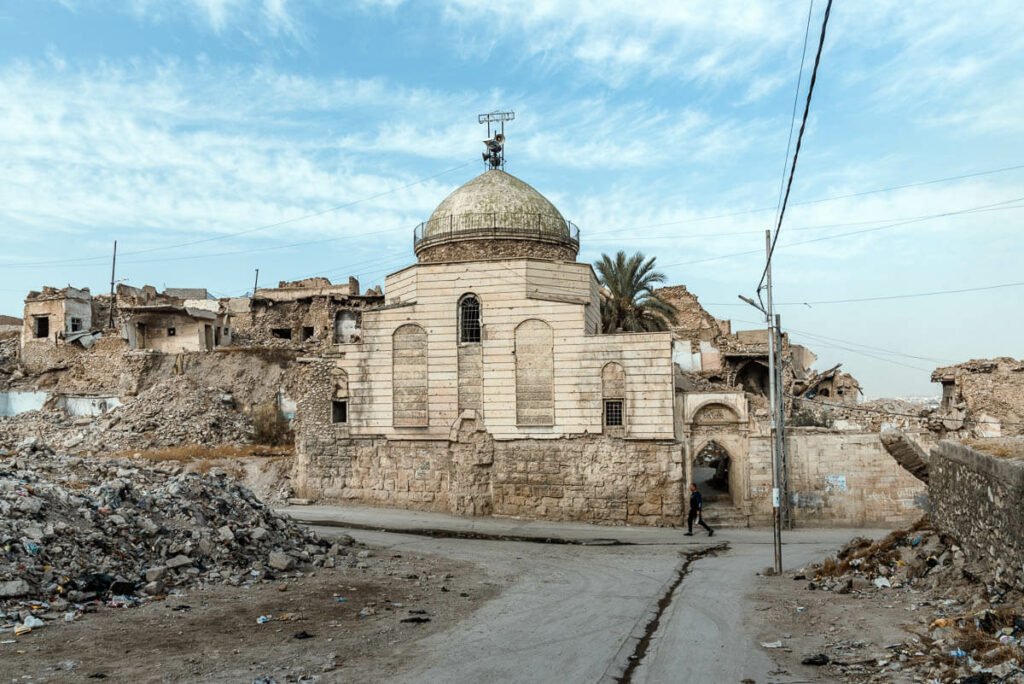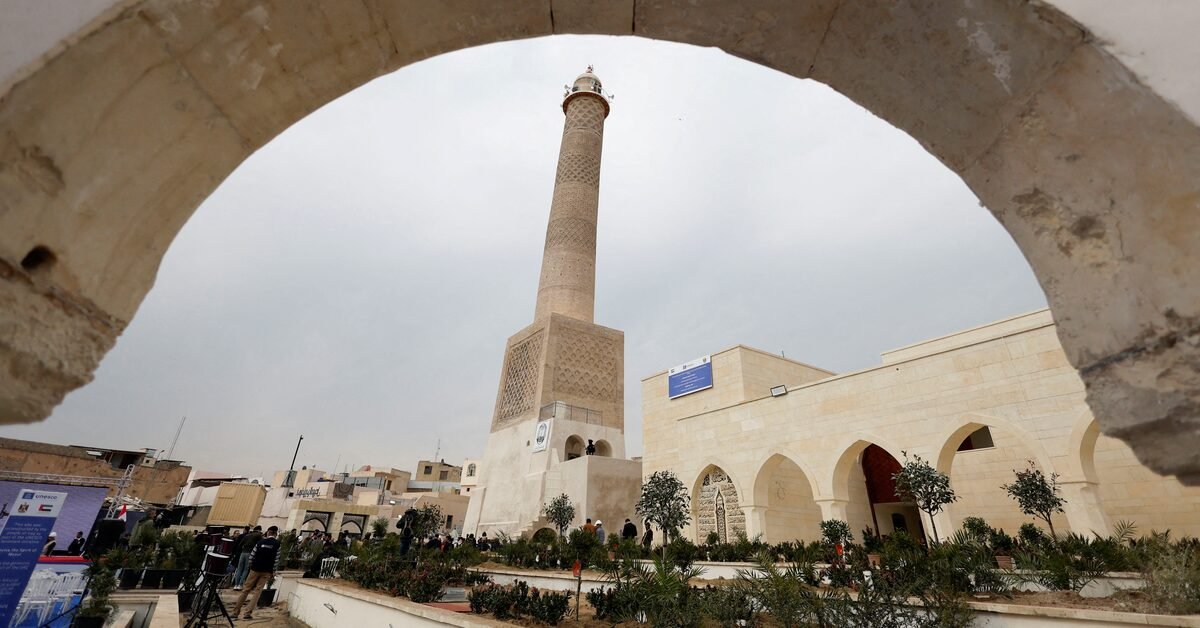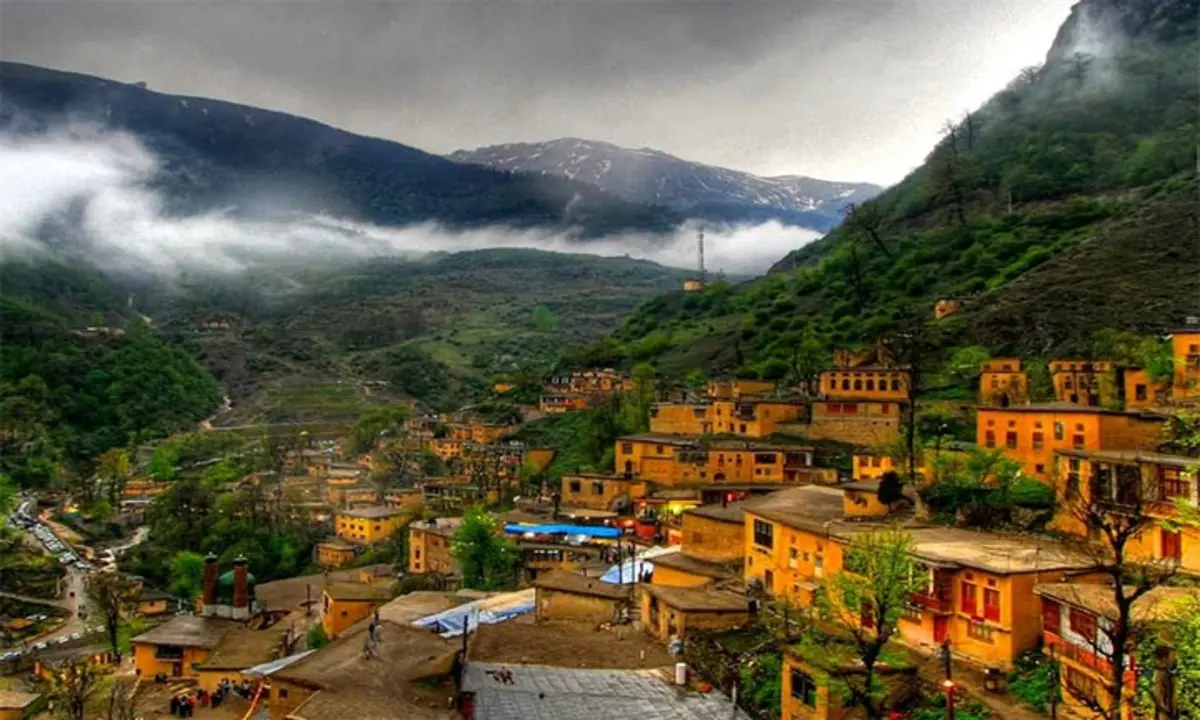Understanding Mosul in 2025: Current Context
Mosul, situated on the Tigris River in northern Iraq, is divided into East (New Mosul) and West (Old Mosul) sections. The Old City, heavily damaged during the fight against ISIS, is a mosaic of rubble and renewal, with landmarks like the Al-Nuri Mosque under reconstruction. Despite its challenges, Mosul’s bazaars are lively, and its people are known for their hospitality, making it a compelling destination for those seeking history and human connection.
As of 2025, the U.S. State Department, UK Foreign Office, and other governments maintain a Level 4: Do Not Travel advisory for Iraq, including Mosul, due to risks of terrorism, kidnapping, armed conflict, and violent crime. However, reports from recent travelers and locals suggest Mosul is relatively stable compared to Baghdad, with no significant crime against tourists and a strong community spirit. Reconstruction efforts are ongoing, and the absence of ISIS as a territorial force since 2019 has improved safety, though caution remains essential.
Safety Considerations: Prioritizing Your Security
Traveling to Mosul demands heightened vigilance due to Iraq’s complex security landscape. Here are key safety precautions to ensure a secure visit:
- Monitor Travel Advisories: Regularly check updates from the U.S. State Department, UK Foreign Office, or your country’s travel advisory. Enroll in the Smart Traveler Enrollment Program (STEP) for real-time alerts and embassy assistance in emergencies.
- Avoid High-Risk Areas: While Mosul is safer than some Iraqi cities, avoid isolated areas, especially in the Old City, where reconstruction zones may be restricted or unstable. Stick to well-populated areas like bazaars and guided sites.
- Travel with a Guide: Independent travel is possible, but hiring a local guide fluent in Arabic or Kurdish is highly recommended. Guides can navigate checkpoints, uncover hidden gems, and ensure safety. Reputable agencies like Aknaf Al Sawary offer guided tours.
- Secure Transportation: Arrange private drivers through trusted hotels or tour operators. Avoid public transport like shared taxis for short trips within Mosul due to unpredictable security.
- Stay Discreet: Do not display valuables (e.g., cameras, cash) or discuss travel plans publicly. Dress modestly to blend in and avoid drawing attention.
- Prepare for Checkpoints: Military and police checkpoints are common. Carry your passport, visa, and a certified copy of your registration at all times. Be polite and patient, as delays can occur.
- Emergency Planning: Have a contingency plan, including embassy contacts and a safe evacuation route. Consular support is limited, as New Zealand and other countries lack diplomatic presence in Iraq.
Note: The Mosul Dam, located upstream, poses a risk of flooding if it fails. Monitor local media and have an evacuation plan for this unlikely scenario.
Entry Requirements: Visas and Vaccinations
Entering Iraq, including Mosul, involves navigating specific requirements. Here’s what you need to know:
- Passport and Visa: Your passport must be valid for at least six months beyond your entry date. Most nationalities, including U.S., UK, and EU citizens, can obtain a Visa on Arrival (VOA) at Baghdad or Basra airports for $77, valid for 60 days. However, entering from Iraqi Kurdistan (e.g., Erbil) by road does not allow VOA due to the lack of an official border. If arriving via Erbil, secure a visa besides visa in advance through the Embassy of Iraq in your home country. Kurdistan visas are separate and not valid for Federal Iraq, including Mosul.
- Vaccinations: Ensure routine vaccinations (e.g., MMR, polio) are up to date. Hepatitis A, Typhoid, and Rabies vaccines are recommended due to poor sanitation and stray animals. Consult a travel health clinic 4–6 weeks before departure. No specific COVID-19 requirements are noted for 2025, but verify closer to your trip.
- Travel Insurance: Comprehensive insurance is mandatory, covering medical evacuation, trip cancellation, and high-risk destinations like Iraq. Confirm coverage for Mosul, as some policies exclude war zones.
- Health Precautions: Mosul’s air and water quality are poor. Drink only bottled water, avoid raw foods, and use insect repellent to prevent mosquito-borne diseases like leishmaniasis. Healthcare facilities in Mosul are limited, with low-quality services and moderate costs.
Getting to Mosul: Transportation Options
Mosul is accessible by road from major Iraqi cities or Iraqi Kurdistan, but air travel is limited. Here’s how to get there:
- By Air: Mosul International Airport remains closed in 2025. The nearest airports are in Erbil (90 km away) or Baghdad (400 km away). Fly into Erbil via airlines like Turkish Airlines, Qatar Airways, or Royal Jordanian from hubs like Istanbul, Doha, or Amman. From Erbil, take a shared taxi (5,000–10,000 IQD, ~$3–$7) or private car (arranged via hotels) to Mosul, a 1–2-hour drive. From Baghdad, shared taxis cost 25,000–30,000 IQD (~$17–$20) for a 3–4-hour ride from North Allawi Garage.
- By Road from Erbil: Shared taxis depart from Erbil’s bus station. The route is straightforward, but expect checkpoints. Private drivers are safer and cost $50–$100 for a group.
- By Road from Baghdad: Shared taxis or minibuses connect Baghdad to Mosul. Shared taxis are faster and more comfortable but slightly pricier than buses. Ask for the “Mosul garage” at Baghdad’s taxi stations.
- Within Mosul: Use private drivers or taxis arranged through your hotel. Avoid walking alone at night or in reconstruction zones. No trains or reliable public buses operate in Mosul.
Warning: A Kurdistan visa does not permit travel to Mosul, and vice versa. Ensure you have the correct visa before crossing regional boundaries.

Top Destinations in and Around Mosul
Mosul and its surroundings offer a wealth of historical and cultural attractions. Focus on guided visits to maximize safety and insight. Here are top spots for friends or solo travelers:
- Old City of Mosul: A Living History
- Why Visit? The Old City, though heavily damaged, is a testament to Mosul’s resilience. Its narrow streets and bazaars are lively, offering a glimpse into daily life.
- Activities: Explore the Mosul Souk, a bustling market for spices, textiles, and local snacks like kubba (stuffed dumplings). Visit the reconstruction site of the Al-Nuri Mosque, famous for its leaning minaret (destroyed in 2017, rebuilding ongoing).
- Tips: Hire a guide to navigate restricted areas and uncover hidden sites, like ancient churches or mosques. Avoid photographing military personnel or damaged infrastructure.
- Nineveh Archaeological Site: Cradle of Civilization
- Why Visit? Nineveh, an ancient Assyrian capital (7th century BCE), is a UNESCO World Heritage Site with remnants of city walls and palaces.
- Activities: Explore the Mashki Gate and Adad Gate, partially restored after ISIS destruction. Learn about Nineveh’s biblical significance (Book of Jonah).
- Tips: Located east of the Tigris, it’s a short drive from Mosul. Combine with a guided tour for historical context.
- Hatra: The Desert Fortress
- Why Visit? This 2,000-year-old Parthian city, 110 km south of Mosul, blends Greek, Roman, and Mesopotamian architecture. A UNESCO site, it was used by ISIS but is now accessible.
- Activities: Marvel at the Great Temple and intricate carvings. Note ISIS graffiti as a reminder of recent history.
- Tips: No public transport; hire a private car ($100–$150 round trip). Visit early to avoid midday heat (up to 42°C in summer).
- Bakhdida (Qaraqosh): Christian Heritage
- Why Visit? Iraq’s largest Christian town, 30 km southeast of Mosul, welcomed Pope Francis in 2021. It’s a peaceful contrast to Mosul’s bustle.
- Activities: Visit the Mar Behnam Monastery and Al-Tahira Church, restored after ISIS damage. Engage with locals to learn about their resilience.
- Tips: Accessible by private car or guided tour. Respect religious sites by dressing modestly.
Note: Avoid areas like Al-Qaim or Hawijah, where security risks remain high.
Accommodation: Where to Stay in Mosul
Mosul offers basic to mid-range hotels, with limited luxury options. Focus on secure accommodations:
- Budget: Alsfer Hotel (Old City, ~$30–$50/night) is simple but clean, near restaurants and bazaars.
- Mid-Range: Modern Palace Hotel (~$60–$100/night) offers comfortable rooms and breakfast but is in a darker area outside the Old City.
- Tips: Book via Booking.com or directly with hotels. Choose properties with security guards. Pay online to avoid carrying cash. ATMs are scarce, so carry U.S. dollars (widely accepted) or Iraqi dinars (IQD).
Budgeting for Your Trip
Mosul is one of Iraq’s cheaper cities, but safety measures increase costs. Daily budget per person:
- Accommodation: $30–$100 (shared rooms save costs).
- Food: $5–$15 (local meals like biryani or tashreeb are affordable).
- Transport: $20–$50 (private drivers or taxis).
- Activities: $10–$30 (guided tours or entry fees).
- Total: ~$65–$195/day, plus emergency funds ($500+).
Tip: Bargain politely at bazaars but expect fixed prices at hotels.
Cultural Tips: Respecting Local Customs
Mosul’s culture is predominantly Arab with Sunni and Christian influences. Respecting norms enhances your experience:
- Language: Arabic is the primary language; English is rare. Learn phrases like “Salam Alaikum” (peace be upon you) or “Shukran” (thank you).
- Dress: Men and women should dress modestly (e.g., long pants, covered shoulders). Women may consider headscarves in religious sites.
- Behavior: Avoid discussing politics, religion, or Iraq’s conflicts, as these are sensitive topics. Ask permission before photographing locals.
- Hospitality: Iraqis are famously hospitable. Accept tea or small gifts graciously, as refusal may offend.
Health and Safety Precautions
Mosul’s environmental and medical challenges require preparation:
- Medical Supplies: Bring medications, as pharmacies are understocked. Carry a first-aid kit and prescription copies.
- Water and Food Safety: Use bottled water with intact seals. Stick to cooked foods from reputable vendors to avoid foodborne illnesses.
- Natural Disasters: Flood risks are high, especially in spring (March–May). Monitor weather via BBC Weather or local apps.
- Crime Prevention: Petty crime is low, but stay vigilant in crowds. Avoid night travel and keep valuables secure.
Planning Your Itinerary: Tips for Friends
Traveling to Mosul with friends requires coordination for safety and enjoyment:
- Focus on Guided Tours: Book tours with agencies like Aknaf Al Sawary for sites like Hatra or Nineveh. Group tours reduce costs and enhance security.
- Balance Activities: Combine history (Old City, Nineveh) with lighter experiences (Mosul Souk, local dining) to suit varied interests.
- Stay Connected: Use WhatsApp for group coordination, as cell service is reliable in Mosul. Share itineraries with family at home.
- Checkpoint Etiquette: Ensure everyone carries identification and remains calm at checkpoints to avoid delays.
- Group Dynamics: Discuss budgets and preferences early. Mosul’s affordability allows splurges on guides or private transport.

Conclusion
Traveling to Mosul in 2025 is a bold yet enriching adventure, offering a window into Iraq’s past and present. From the ancient ruins of Nineveh to the vibrant Mosul Souk, the city captivates with its history and resilience. However, Iraq’s security risks demand thorough preparation, from securing visas and insurance to hiring guides and monitoring advisories. By focusing on safer areas, respecting local customs, and traveling with caution, you and your friends can experience Mosul’s unique charm while minimizing risks.
Before you go, check real-time updates on X or official sources like the U.S. State Department or Iraq Travel Guide by Against the Compass. With careful planning, your journey to Mosul will be a profound exploration of culture, history, and human spirit. Safe travels!



